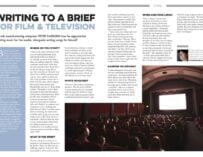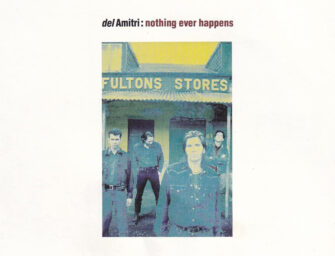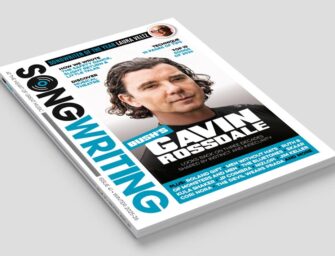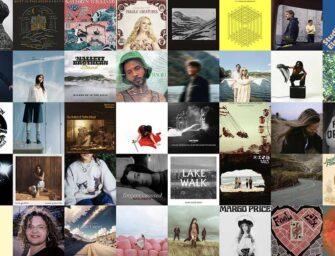
Mix ‘N’ Sync represents records labels, individual songwriters and producers for sync.
Creating music for ‘sync’ has become an increasingly important option for songwriters. We asked an industry expert how it works.
 iven today’s ever-changing music industry, it’s important for an aspiring songwriter to explore as many different options as possible. With less money, and opportunity, in traditional recording, writing music for the media has become a vital necessity for many artists. In order to better understand what sync music is, how a songwriter can best maximise their chances of being signed by an agency and what they can expect if they do get signed, we spoke to Music Consultant Debo Adebayo from London-based agency Mix ‘N’ Sync…
iven today’s ever-changing music industry, it’s important for an aspiring songwriter to explore as many different options as possible. With less money, and opportunity, in traditional recording, writing music for the media has become a vital necessity for many artists. In order to better understand what sync music is, how a songwriter can best maximise their chances of being signed by an agency and what they can expect if they do get signed, we spoke to Music Consultant Debo Adebayo from London-based agency Mix ‘N’ Sync…
Tell us about the sync side of what you do?
“Mix ‘N’ Sync represents records labels, individual songwriters and producers for sync. My expertise is mostly electronic music. Although I do know about the commercial side my passion is more the underground scene – I try to represent those artists and genres and get their music out there via sync.
“There are two main sides to our sync work, the A&R side where we are signing artists to work with and the business development side where we are looking for clients. I have a stable of artists that I believe in and whose music I am passionate about. On the other side I am constantly working to increase our contact base with advertising agents, film companies, production companies, brands directly and other music supervisors.
“Depending on what briefs we are sent we then send the relevant music. We represent existing catalogue so a client might send over a brief and then we have something that matches it exactly, they say yes, the budget is agreed, the licence is signed and then it’s done. Alternatively sometimes people want a piece of music that is written to brief, we have the artists that can do that.”
[cc_blockquote_right] THERE ARE MANY ARTISTS THAT LOVE MAKING MUSIC FOR FILM, TV AND ADS [/cc_blockquote_right]
And you have had success both ways?
“Yes, for example Bishi was approached and we were asked for one of her tracks for a Julian Temple documentary. They knew they wanted her track Albion Voice, so we just had to send it over and sign the licence. On the flipside, a Random Acts short film for Channel 4 liked some of the things Hannah Holland had done before but wanted something new, so she wrote a few original pieces for them and was credited as a composer.”
What advantages are there for an artist working in sync?
“Firstly the extra income factor, especially as an independent artist. If you have your music released by a label these days you don’t make much money from your sales so you need additional revenue streams and sync is one way of doing that. If you become successful and work with a company like us one and you are happy that your credibility isn’t being questioned it can be great.
“It’s really creative as well. You are working to visuals and a brief. You get to see something which you are then asked to create the music for. A lot of artists are always picturing things anyway, picturing moving images. They watch something or see something and then want to go and write a song because it has inspired them. There are many artists that love making music for film, TV and ads.”

Debo Adebayo, Music Consultant at Mix ‘N’ Sync
Is it for everyone?
“No, some don’t want to be given a brief or have to stick to a really strict deadline. Lots of artists don’t work in that way, but it works really well for others as it makes them finish work. There are musicians I know that could be writing a track for weeks and months but never get round to finishing it. With us you might have a deadline of a day or two days, the artist needs to be able to give us something of the right quality that we can give to the clients on time, or everybody is screwed. So it helps to have good habits, actually finishing tracks and being happy with what you’ve done. It adds a bit of discipline to the art form.”
What advice would you give songwriters wanting to approach you for representation?
“I don’t think I’m that different from other people, I really loathe it when I get sent three large MP3s that take ages to load and fill up my inbox. It sounds a bit fussy but I’d just like a SoundCloud link, a nice friendly email and maybe some artwork. I really like pictures, if I can see something visually that looks cool I am more likely to click the link.
“Send an email that’s clear and shows you’ve done a bit of research into the artists we represent; go on the website, listen to some of the tracks and read what we’re about. It feels like basics, it’s common sense. Let me know a bit of your history and if you’re just starting don’t feel like you need to have had some success for me to be able to pick up on your pitch.”
Is that how you usually discover new talent?
“About 75% I’ve scouted out myself and 25% have pitched in. I listen to a lot of music and if hear an artist or track I quite like, or see something cool when I am out or on social media I might do a bit more research to see what kind of setup they have and if anyone is representing them. I then might make an approach.
“The reason I started Mix ‘N’ Sync was that I had been DJing and working in the industry for quite a long time and felt that there were all these labels and artists releasing great music that had decent followings but not the manpower to have a dedicated sync licensing department. Going from one gig to another you hear this and that artist, you listen to them and like what they do, you get chatting to them, find out that they haven’t got any representation or haven’t even heard about sync but they are willing to find out about it and do some work within it.”

Debo: “I really like work ethic, an artist that is working hard at their craft and is not too flaky.”
Aside from talent what else do you look for in your artists?
“I really like work ethic, an artist that is working hard at their craft and is not too flaky. If I email them and get a response back soon it makes a huge difference.
“In terms of how we work it’s important to build up relationships with music supervisors, directors, producers and agencies and we’re hoping from the artist’s point of view that they’re sending us a regular stream of new music. Generally people want music that sounds quite current. Some artists are better than others in terms of keeping us updated and that really makes a difference.
“I like being close with the artist and hearing what they’re doing from week to week, month to month. If that artist is doing more and telling me about it, being reviewed or mentioned in blogs, I can build that into the company marketing.”
[cc_blockquote_right] DON’T TRY AND MAKE THINGS THAT OTHER PEOPLE ARE MAKING JUST BECAUSE IT’S COOL [/cc_blockquote_right]
What might a songwriter be asked to do differently when working in sync?
“It’s good to have different versions of a track available. We always say, have your instrumental version as well as your full lyrical version. Some of the time you may have the right lyric but it isn’t in the right style. If the artist has the time and ability they could think about writing the same song in other styles and tempos to give it more of a chance of meeting different types of briefs. Not all artists want to do that, or are able, but there are some that can and are willing. It’s also a good creative exercise for the artist.”
What makes for a successful sync track?
“I hate the term ‘syncable’, I think when people say that they’re really just talking about trends. Sometimes you’ll hear a certain style or genre being used and you’ll think to yourself ‘that’s a syncable sound’ when really it’s just something a particular advert has used that has done really well, then the other agencies start thinking that’s a cool sound, let’s use it again. Artists start trying to replicate it rather than realising that it was just the current zeitgeist that captured a certain moment in time. We want to be known to be working with the artists that are influencing the next trends”
Do you have any final advice for an aspiring sync artist?
“Be yourself as an artist. Write what you believe in and someone like myself as a sync agent, or a publisher or a label will be more likely to pick it up. Don’t try and make things that other people are making just because it’s cool.”
Interview: Duncan Haskell
For further information about synchronisation licensing, music supervision and consultancy at Mix ‘N’ Sync, along with Debo and the agency’s contact details, go to www.mixnsync.com




































Articles like this are both interesting and informative, even a lay person can understand as its not too ‘techy’ or pretentious. I have to say I look forward to each issue.
The article is not so much as an advertisement for their business but more like an ‘informercial’. Nicely paced. Your writer kept it the right side of the fence. It certainly made me want to investigate it more. Debo comes across as someone who is actually interested and passionate in what he does and he sells his business very well in the right way from the point of musicians.